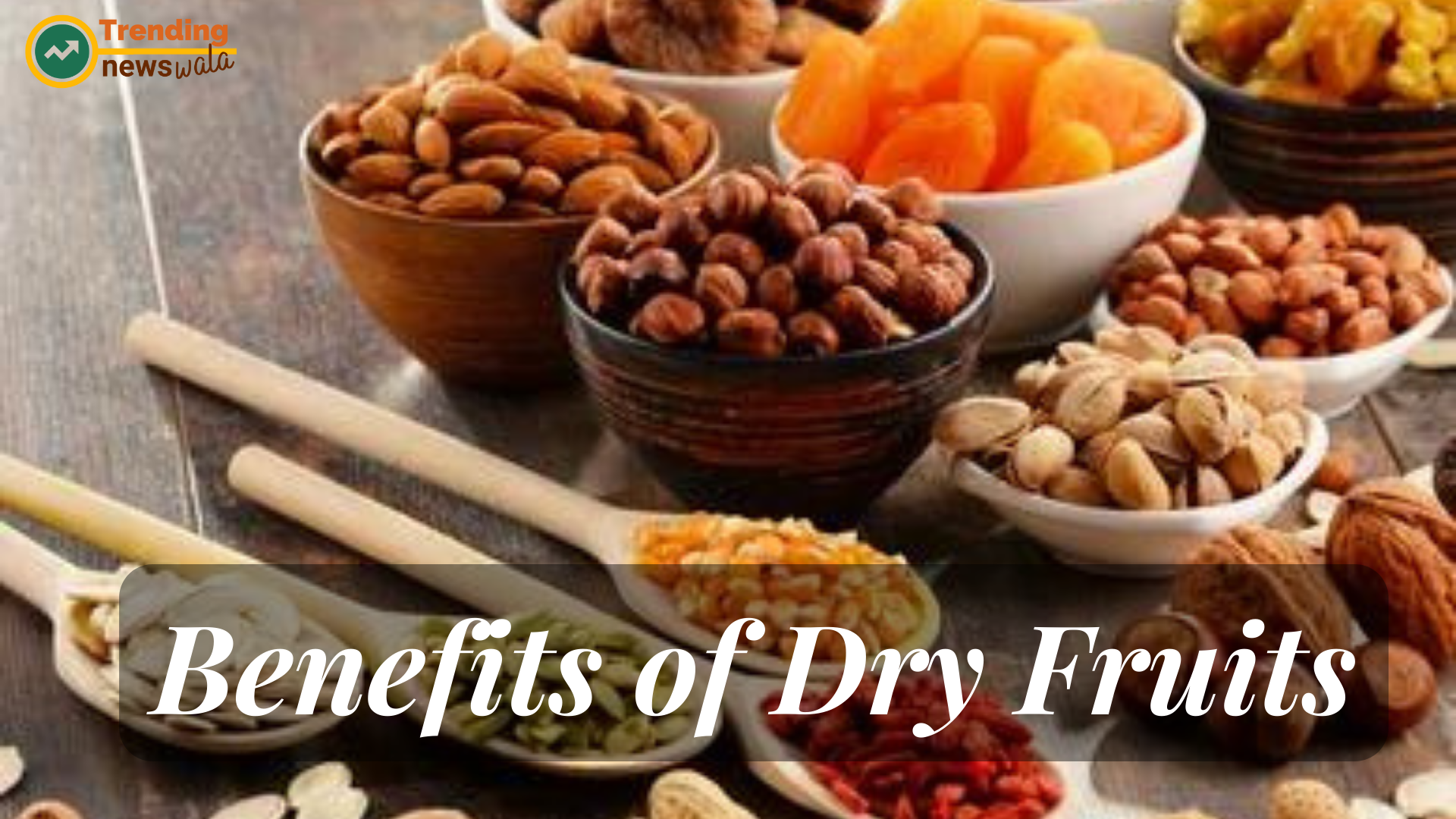Dry fruits are fruits that have been dried, either naturally or through the use of specialized equipment or techniques. The process of drying removes the water content from the fruit, resulting in a more concentrated form of the fruit's nutrients and flavors. Common examples of dry fruits include raisins, apricots, prunes, figs, dates, and cranberries.
Dry fruits are often considered a healthy snack due to their high nutritional value. They are a good source of fiber, vitamins, and minerals, and can help regulate blood sugar levels. Additionally, they have a longer shelf life compared to fresh fruits, making them a convenient and portable snack option.
Dry fruits can be consumed on their own as a snack, or they can be used in a variety of dishes such as cakes, cookies, bread, and salads. They can also be added to oatmeal or yogurt for extra flavor and nutrition.
10 Benefits of Dry Fruits
Here are 10 benefits of consuming dry fruits:
1. Rich in Nutrients: Dry fruits are an excellent source of essential nutrients like vitamins, minerals, fiber, and antioxidants. They contain high amounts of potassium, iron, magnesium, and calcium.
2. Boosts Immunity: Dry fruits are loaded with immune-boosting nutrients like vitamin C, vitamin E, and zinc. These nutrients help to strengthen the immune system and protect the body against infections and diseases.
3. Improves Digestion: The fiber content in dry fruits aids digestion and prevents constipation. They also help in maintaining a healthy gut microbiome.
4. Promotes Heart Health: Dry fruits are rich in healthy fats, fiber, and antioxidants that help to lower cholesterol levels, reduce the risk of heart disease, and improve cardiovascular health.
5. Regulates Blood Sugar: Dry fruits like dates and prunes have a low glycemic index, which means they do not cause a sudden spike in blood sugar levels. They can help regulate blood sugar and prevent diabetes.
6. Supports Bone Health: The high amounts of calcium and magnesium in dry fruits promote healthy bone growth and prevent osteoporosis.
7. Reduces Inflammation: The antioxidants and anti-inflammatory compounds present in dry fruits help to reduce inflammation in the body and prevent chronic diseases.
8. Improves Skin Health: Dry fruits like almonds and walnuts are rich in vitamin E, which helps to improve skin health, prevent premature aging, and reduce the risk of skin cancer.
9. Helps in Weight Management: Dry fruits are a low-calorie and high-nutrient snack that can help in weight management. They also help to reduce hunger pangs and keep you feeling full for longer.
10. Prevents Anemia: Dry fruits like raisins and prunes are rich in iron, which helps to prevent anemia and improve blood circulation.
Types of Dry Fruits
1. Raisins: Dried grapes that are high in fiber, potassium, and iron. They are commonly used in baked goods and snacks.
2. Dates: A sweet fruit with high levels of potassium, fiber, and antioxidants. They are often used in baked goods and as a natural sweetener.
3. Prunes: Dried plums that are high in fiber, vitamins, and minerals. They are commonly used to help with digestion.
4. Figs: A sweet fruit that is high in fiber, potassium, and calcium. They are often used in baked goods and snacks.
5. Apricots: A sweet fruit that is high in fiber, vitamin A, and antioxidants. They are often used in baked goods and as a snack.
6. Almonds: A nut that is high in healthy fats, protein, and fiber. They are often used in baking, snacking, and as a garnish.
7. Cashews: A nut that is high in healthy fats, protein, and minerals. They are often used in baking, snacking, and as a garnish.
8. Pistachios: A nut that is high in protein, healthy fats, and fiber. They are often used in baking, snacking, and as a garnish.
9. Walnuts: A nut that is high in healthy fats, protein, and omega-3 fatty acids. They are often used in baking, snacking, and as a garnish.
10. Pecans: A nut that is high in healthy fats, fiber, and antioxidants. They are often used in baking and as a snack.
11. Brazil nuts: A nut that is high in healthy fats, protein, and selenium. They are often used in baking and as a snack.
12. Hazelnuts: A nut that is high in healthy fats, protein, and vitamin E. They are often used in baking and as a snack.
13. Macadamia nuts: A nut that is high in healthy fats and protein. They are often used in baking, snacking, and as a garnish.
14. Pine nuts: A nut that is high in protein, healthy fats, and magnesium. They are often used in baking, snacking, and as a garnish.
15. Chestnuts: A nut that is low in fat and high in fiber and vitamins. They are often used in baking and as a snack.
16. Dried cranberries: A sweet and tangy fruit that is high in antioxidants and fiber. They are often used in baking and as a snack.
17. Dried cherries: A sweet and tart fruit that is high in antioxidants and fiber. They are often used in baking and as a snack.
18. Dried blueberries: A sweet and tangy fruit that is high in antioxidants and fiber. They are often used in baking and as a snack.
19. Dried mangoes: A sweet and tangy fruit that is high in vitamin C, fiber, and antioxidants. They are often used in baking and as a snack.
20. Dried papayas: A sweet and tangy fruit that is high in vitamin C, fiber, and antioxidants. They are often used in baking and as a snack.
Can dry fruits cause allergies?
Yes, dry fruits can cause allergies in some individuals. Dry fruits, such as raisins, figs, dates, apricots, and prunes, are known to contain high levels of sulfites, which are a common cause of allergic reactions. Sulfites are used as preservatives to keep dried fruits fresh and prevent discoloration.
In addition to sulfites, some individuals may be allergic to proteins found in nuts, such as almonds, walnuts, and pistachios, which are commonly added to dried fruit mixes. Allergic reactions can range from mild symptoms, such as hives and itching, to more severe symptoms, such as difficulty breathing and anaphylaxis.
If you suspect that you may have an allergy to dry fruits, it is important to speak with your healthcare provider or an allergist. They can help diagnose and manage your allergy, and provide guidance on how to avoid potential allergens in your diet.
FAQ for Benefits of Dry fruits
Q: What are dry fruits, and what are their benefits?
A: Dry fruits are fruits that have been dried to remove their moisture content. They are packed with nutrients and have several health benefits, including improving digestion, boosting immunity, and providing a good source of energy.
Q: What types of dry fruits are the healthiest?
A: All types of dry fruits have their own unique set of health benefits. However, some of the healthiest dry fruits include almonds, walnuts, pistachios, apricots, figs, and dates.
Q: Are dry fruits high in calories?
A: Dry fruits are typically higher in calories than fresh fruits due to their concentrated sugar content. However, they are also high in fiber, protein, and healthy fats, which can help keep you full and satisfied.
Q: Can dry fruits help with weight loss?
A: While dry fruits are high in calories, they can still be included as part of a healthy weight loss diet in moderation. Their high fiber content can help promote feelings of fullness and reduce cravings for unhealthy snacks
Q: Can dry fruits help with digestion?
A: Yes, dry fruits are a good source of dietary fiber, which can promote healthy digestion and prevent constipation.
Q: Can dry fruits improve heart health?
A: Yes, dry fruits are rich in antioxidants, which can help reduce inflammation in the body and prevent heart disease. They are also a good source of healthy fats, such as omega-3 fatty acids, which can help lower cholesterol levels.
Q: Are there any potential drawbacks to eating dry fruits?
A: While dry fruits have several health benefits, they are also high in sugar and calories. It's important to eat them in moderation as part of a balanced diet and to be aware of the added sugars in some commercially produced dried fruits.
Q: Can people with diabetes eat dry fruits?
A: People with diabetes can eat dry fruits in moderation as part of a balanced diet. However, it's important to be mindful of their sugar content and to speak with a healthcare provider about individualized dietary recommendations.



